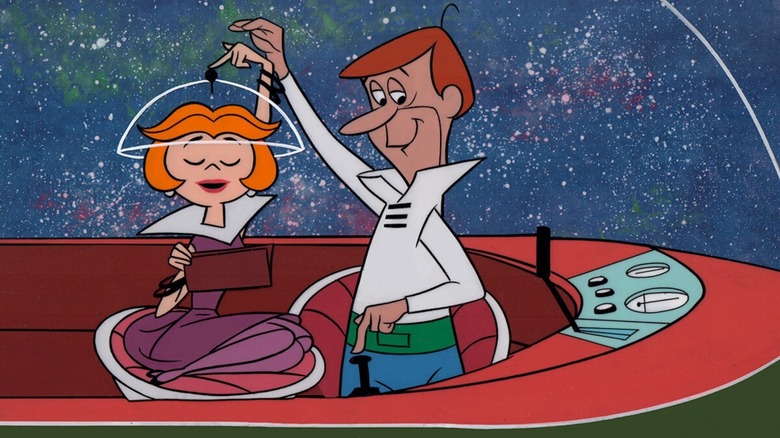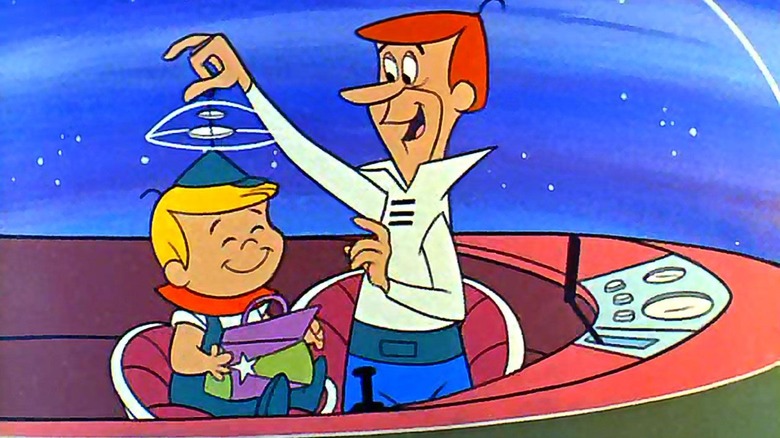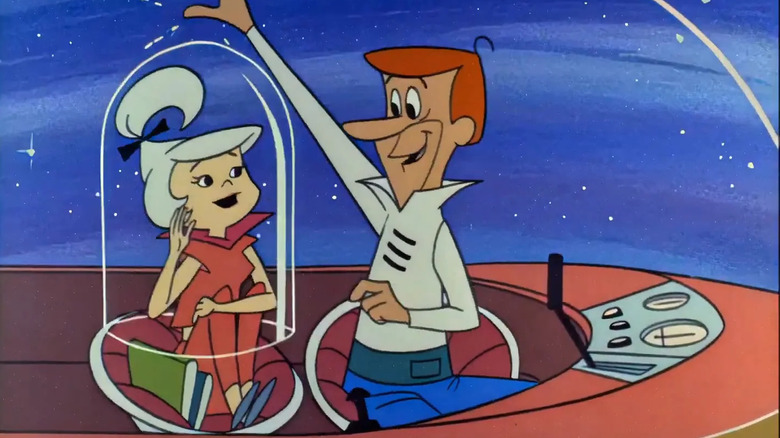How The Jetsons Theme Song Became A Hit Of Its Own
Hanna-Barbera's sci-fi sitcom "The Jetsons" debuted in 1962, only two years after the studio had a major hit with "The Flintstones" (an open-faced riff on "The Honeymooners" that told typical, old-fashioned sitcom stories but transposed the action to the Stone Age). The logic behind "The Jetsons" seemed to be that if one show could work in the distant past, then a very similar show ought to work in the distant future. "The Jetsons" was set in the far-off future year of 2062, where Earth's citizens have access to flying cars, robot maids, and various other bizarro technologies the mind could fathom. Despite civilization's advances, however, George Jetson (George O'Hanlon) was still a hollowed-out salaryman in the unhappy employ of a soulless widget-making corporation. His wife Jane (Penny Singleton) was a housewife. The dull, middle-class values of the 1950s, it seems, would resurge 90 years later.
The series ran only for one 24-episode season and was canceled in 1963. It left a sizable footprint, however, and was revived for two more seasons in 1985.
The catchy theme song for "The Jetsons" was crafted by Hoyt Curtin, the long-time composer for Hanna-Barbera who worked for the company from 1957 to 1965, then again from 1972 through to his retirement in 1986. Curtin wrote the theme songs for "The Flintstones," "The Smurfs," "Jonny Quest," "Josie and the Pussycats," and many others. Gen-X kids will likely thrill to hear Curtin's unusual "swirling" music for the Hanna-Barbera Productions logo that played after the company's many cartoons.
As reported by the Los Angeles Times in 1986, Curtin was shocked to learn that his theme for "The Jetsons" — composed 14 years earlier — was climbing the Billboard Hot 100. It seems that a bizarre set of circumstances led to the song's newfound popularity.
Meet George Jetson
The theme song for "The Jetsons" is a peppy, upbeat "spacey" big band/lounge number that introduces each character by name. "Meet George Jetson, his boy Elroy, daughter Judy, Jane, his wife." Each character has a miniature theme of their own embedded into the unifying theme. Like with "The Flintstones," the theme for "The Jetsons" communicates facts about the show rather than just serenading viewers. It was catchy enough that young fans could hum it to one another in the schoolyard.
In 1985, a lot of Curtin's theme songs — as well as many other notable TV theme songs — found their way onto the compilation CD "Television's Greatest Hits: 65 TV Themes! From the '50s and '60s." This was to be the first in an eight-volume line of TV theme and commercial jingle compilations put out by TVT Records. These CDs were immensely popular, and were, for many years, the only way to listen to certain theme songs that had been lost to time. Because some of the original masters for the older TV shows were lost, several themes were re-recorded with a new orchestra. One of the themes requiring re-recording was "The Jetsons."
According to the Times, the re-recorded version of the "Jetsons" theme was given to radio stations, and some DJs with a healthy taste for kitsch began playing it as part of their regular rotations. It became requested enough that within months, the theme hit #9 on the Hot 100. "Every time I hear that damn thing I'm amazed," Curtin was quoted as saying. "Man, that tune swings. [...] If it doesn't swing, the heck with it. The music has to have some excitement, some reason."
It seems that TVT Records' playful archiving practice led to a newfound appreciation for Curtin's songwriting acumen.
Jazzy Jetsons
In the mid-1980s, Hanna-Barbera Productions was owned by a parent company called Taft Entertainment (which owned a lot of TV and radio stations in the eastern part of the United States). The vice president of Taft's music division, Karyn Ulman, noted to the Times that the surge in popularity for "The Jetsons" wasn't much of a surprise. She, along with anyone her age, likely recalled the trend in mainstream jazz and lounge of reinterpreting pieces of popular music for the adult contemporary crowd; some may have heard Helmut Zacharias' version of The Doors' "Light My Fire," for example. For Ulman, "The Jetsons" was covered often, and many musicians asked for permission to record it. As Ulman put it:
"Over the years jazz artists have played it live. We've had requests from pop and New Wave bands to use 'The Jetsons.' We've had so many requests from radio stations and individuals across the nation, we knew it was going to be a hit."
The surge in popularity of the theme song accompanied the celebrated return of the series. The revival updated the aesthetics somewhat, and the stories were updated to fit the trends of the 1980s. However, the show itself was similar enough to be placed alongside the original.
For the Times, Curtin felt that he wasn't widely appreciated for his profound and long-running influence on popular culture. "Naturally," he said "it's great to get a little more recognition. [...] A lot of people don't have the faintest idea what I do.
Some of us do, Mr. Curtin.
Hoyt Curtin passed away in 2000. His legacy, however, lives on to this day.


